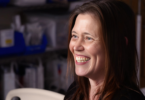In health care, the need for comprehensive evaluation and improvement of services is crucial to ensure effective delivery of services and equitable access. One such area that has drawn significant attention is the provision of health services for people who use substances, particularly during pregnancy and after birth. In B.C., the number of deliveries with perinatal substance use has nearly doubled from 2001 to 2020.
A recent evaluation, led by Advancing Health Scientist Dr. Bohdan Nosyk’s team at the Centre for Advancing Health Outcomes, including Micah Piske, Michelle Zanette, Youwei Yan, Megan Kurz, and Fahmida Homayra, and Simon Fraser University, including Shannon Joyce and Noah Katsuno, in partnership with the First Nations Health Authority (Dr. Brittany Barker), sheds light on the experiences of people accessing health services for perinatal substance use and highlights areas for improvement.
The team hosted a series of five sharing circles in May and June of 2023. These circles provided a space for people with lived or living experiences (PWLLE) of pregnancy and substance use to share their stories accessing health services across B.C. One meeting was held in each health authority region of B.C.: Kelowna (Interior), Port Hardy (Vancouver Island), Prince George (Northern), Vancouver (Vancouver Coastal), and Surrey (Fraser). In total, 48 PWLLE participated in the discussions, which centered around the types of services accessed, the accessibility and cultural safety of services, and participants’ priorities and visions for improving services in their home communities.

The insights gathered from these discussions were turned into a graphic recording by Wet’suwet’en artist Michelle Buchholz. This illustration not only captures the essence of the conversations but also serves as a tool for knowledge sharing and facilitating feedback from participants to ensure alignment with their experiences.
Shannon Joyce, a Registered Perinatal Nurse in Nanaimo and Research Assistant on the project, says that the team heard from sharing circle participants about the need for more services to support parents impacted by substance use in the province, especially outreach workers, supportive housing facilities, and wrap-around community centres.
“It was an honour to meet women in their communities and hear their experiences of accessing services for substance use in pregnancy. Many of the stories were heartbreaking and yet spoke to the resilience and perseverance of these mothers,” she said. “We heard that services that supported mom and infant to be together, incorporated holistic care including Indigenous culture, and were based on relationships were experienced as accessible and safe, and those which do not were often mistrusted and avoided.
Bringing people together to share knowledge and solutions
On March 11th, 2024, the team held a Knowledge Exchange event in Prince George, bringing together 77 PWLLE, policy makers, researchers, and care providers. This event served as a platform to disseminate findings from the sharing circles and related works, including an environmental scan identifying all health services for perinatal substance use available in BC and insights from provincial health administrative data to gauge health care quality and regional perinatal health.

On March 11th, 2024, the team held a Knowledge Exchange event in Prince George, bringing together 77 PWLLE, policy makers, researchers, and care providers.
“We chose to host the event in Prince George, in Northern B.C., as our work has revealed substantial regional differences in rates of perinatal substance use as well as inequities in access to care for those in rural and remote areas,” Dr. Nosyk explained. “Rates of substance use among pregnant people residing in the Northern region of the province in 2020 were nearly eight-times higher compared to Metro Vancouver, yet there are very few specialized services available for these women, particularly in acute care”.

The event was held in collaboration with Harmony House, the supportive housing facility in Prince George for birthing people on their healing journey from substance use. To expand their capacity to support the community, Harmony House is working hard to open up a second location. Prince George represents the largest city in Northern B.C. and data illustrate stark regional disparities in rates of perinatal substance use and access to care. Of the 13 specialized acute care beds for perinatal substance use in B.C., only one is outside of Metro Vancouver. Furthermore, an estimated 18 per cent of people accessing care for perinatal substance use reside in Northern B.C., where fewer than four per cent of B.C.’s 127 live-in community beds to support this population are located. This geographical imbalance exacerbates inequities, especially for those in rural and remote areas.
The team’s work with provincial data highlights substantial disparities in maternal and newborn health outcomes among pregnant people who use substances, particularly First Nations women, compared to the general population, highlighting the urgent need for targeted interventions and enhanced support.
The culmination of this evaluation work, including the Knowledge Exchange event and the forthcoming publications, signifies a significant step forward in addressing the complex health care needs of people who use substances in the perinatal period. As the project nears completion, Dr. Nosyk hopes that the team can continue this important work and help establish the evidence base to support the development and expansion of the continuum of care for perinatal substance use across communities in B.C.
“It is imperative that these findings catalyze actionable strategies to improve accessibility, cultural safety, and quality of care for this population across British Columbia,” he said. “We owe it to these women, and their children, to provide a higher standard of care.”
This project was funded by a contribution from Health Canada’s Substance Use and Addictions Program (Health Canada SUAP; 2223-HQ-000028). The views expressed herein do not necessarily represent the views of Health Canada or the data stewards.
This story originally appeared on the Advancing Health website.





